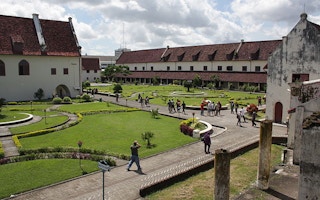Technologies such as wireless sensors, digital government portals, crowdsourcing and mobile phone apps can help cities boost revenue and efficiencies across all sectors of administration.
To reap these benefits, however, cities must invest wisely, define clear goals and protect citizens through strong privacy protections, the Uraia Platform concludes in a recent report.
The Impact of Smart Technologies in the Municipal Budget explores the many benefits — and potential missteps — that city leaders face when they implement the latest digital advancements. Uraia, which means “citizenship” in Swahili, is a joint project of FMDV (Global Fund for Cities Development) and UN-Habitat.
Published with support from the United Nations Capital Development Fund, the report reflects topics discussed at the April 2016 Uraía Workshop in Nicosia, Cyprus. Participants included local government officials, technology and service providers and other stakeholders.
“
Municipalities must be careful not to choose a project according to the private vendors’ offer.
Iñigo de la Serna, former mayor, Santander, Spain
Cities featured in the report include Ovar, Portugal, which implemented a cloud-based tool created by a Portuguese startup to facilitate participatory budgeting. Makassar, Indonesia, distributed 6,000 smartphones to community leaders so they can relay updates via an app on how citizens feel about crime, tax collection, green space and other issues. The Dutch city of Rotterdam turned to crowdfunding to finance construction of a bridge.
A recurrent theme in the report is that city managers must strategise carefully to avoid costly mistakes. Among the recommendations:
- Choose wisely: Delineate precise targets on digital innovation to guide the technology selection process. Set goals by sector, such as transportation, waste management and water.
- Plan ahead: Deploy needed infrastructure, including electricity lines and broadband, in advance to ensure smooth operations. Developing economies that lack infrastructure and resources might want to consider going straight to mobile solutions or cloud computing.
- Prioritise training: Investments in skills training are essential for municipalities to develop technical capabilities to operate advanced systems. Training also builds awareness and motivation among municipal employees.
- Pilot projects: Targeted rollouts can be used to test the efficacy of “transformative” projects. If successful, the pilots can widen community support and generate funding.
- Collaborate: Interaction with national governments and associations of cities can provide essential feedback, guidance and support. Regular dialogue with stakeholders allows all parties to have input.
In 2014, the Uraia Platform convened in Santander, Spain, which has attracted international attention for its ambitious deployment of sensors, cameras and other devices. They are used for purposes that range from monitoring leaks in pipes to alerting drivers when parking spots are open.
The city also launched an online platform, “Santander City Brain,” that allows residents to suggest public improvements.
“Municipalities must be careful not to choose a project according to the private vendors’ offer,” Santander’s former mayor, Iñigo de la Serna, advises in the report. Instead, says De la Serna, who is now Spain’s development minister, cities should “choose the technology that corresponds to their city model.”
Funding mechanisms
While technology can help cities reduce overhead, the upfront costs and maintenance can be daunting, especially in light of budgetary restraints. As a result, officials must calculate whether short-term financial pain is worth the potential long-term gains to be achieved through such upgrades.
The report outlines strategies that municipalities can employ to raise capital. They include leveraging funds from national governments and showcasing accomplishments such as attaining high rankings on quality-of-life indicators to attract investment. Cities that practice good governance convey messages of openness and accountability that resonate with investors, the report says.
The authors note that smart technologies used to combat fraud and corruption can limit financial losses for cities. Increased transparency may help local governments strengthen their creditworthiness, which can spur investment.
Kampala, Uganda, is cited as an example of a city that has leveraged technology and improved local management to raise more tax revenue locally.
There are other considerations during any assessment of new technologies. Cities are urged to conduct studies early on to pinpoint which innovations would be most effective at addressing critical problems and goals.
Attention should be paid to interoperability to ensure that new systems can seamlessly integrate with existing ones. Communication and data sharing across municipal government agencies makes for a smoother deployment.
Legal and regulatory frameworks may have to be updated to encompass emerging innovations, especially to protect privacy. Cities must strike a balance between transparency of information collected and data security, the report says.
Launched in 2014, the Uraía Platform promotes innovation in three main areas of local public management: municipal finance, public services and infrastructure; and transparency and accountability.
The Uraia Network now has more than 100 partners on five continents. Learn more here.
This story was published with permission from Citiscope, a nonprofit news outlet that covers innovations in cities around the world. More at Citiscope. org.










